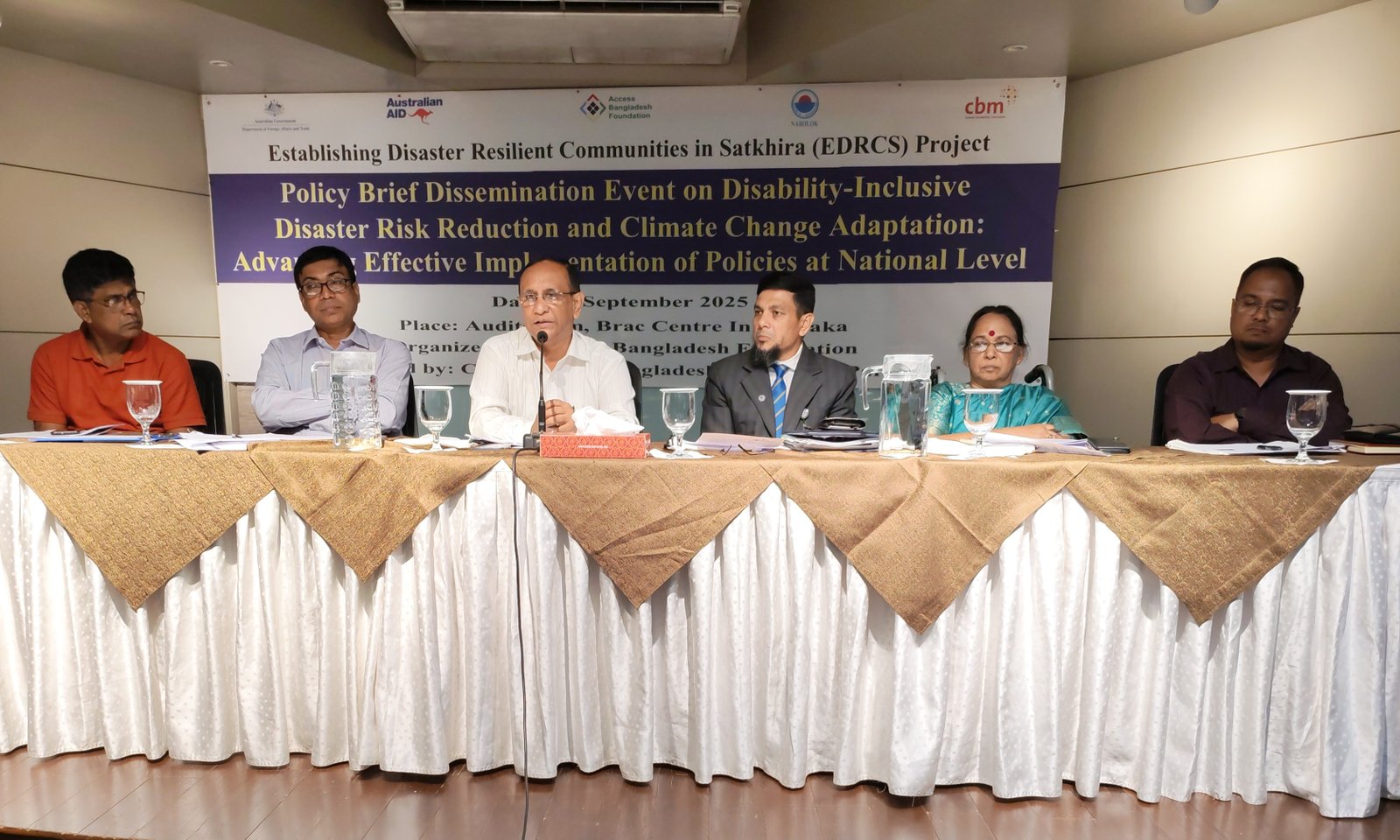Workshop on policy brief for DRR and CCA held in Dhaka
Policy brief reveals gaps in shelters, early warning systems and social protection; experts urge stronger participation of persons with disabilities in national planning

An event titled “Policy Brief Dissemination on Disability-Inclusive Disaster Risk Reduction (DRR) and Climate Change Adaptation (CCA): Advancing Effective Implementation of Policies” was held on Tuesday at Mohakhali in the capital.
The workshop was organised by Access Bangladesh Foundation in collaboration with CBM Global Bangladesh and Nabolok Parishad.
Razwanur Rahman, Director General of the Department of Disaster Management, attended as Chief Guest. Special Guests included Mohammed Zahidur Rahman, Country Director of CBM Global Bangladesh, Abu Daud Md Gulam Mustafa, Joint Secretary of the Ministry of Disaster Management and Relief, and Dr Muhammad Nuzmul Hoque, Deputy Secretary of the Bangladesh Climate Change Trust.
Razwanur Rahman said that the policy brief, by identifying gaps in disaster-related laws, policies, and action plans alongside practical recommendations, would help the government address the needs of persons with disabilities.
During a panel discussion, officials, NGOs, development partners, and organisations of persons with disabilities (OPDs) emphasised the need for stronger accountability, coordination, and inclusion in national and local planning.
Abu Daud Md Gulam Mustafa noted that implementation remains slow due to budget constraints and lack of awareness, but stressed that disability inclusion could be incorporated in the ongoing revisions of the Disaster Management Act 2012, Standing Orders on Disaster 2019, and the National Plan for Disaster Management 2021–2025.
Dr Nuzmul Hoque underlined that the National Adaptation Plan is a living document and must address the needs of persons with disabilities in future updates.
Mohammed Zahidur Rahman pledged technical support to the government in executing policies and action plans to ensure meaningful disability inclusion through its partners and organisations of persons with disabilities (OPDs).
Albert Mollah, Executive Director of Access Bangladesh, moderated the session, which ended with a vote of thanks from Mohua Paul, Chairperson of Access Bangladesh Foundation.
The brief was presented by Md Shohel Rana, head of program at Access Bangladesh.
The brief revealed limited disability inclusion in existing disaster and climate policies, with many local disaster management committees inactive. It pointed out that social safety net programmes often exclude persons with disabilities, while early warning systems fail to reach people with visual and hearing impairments. Most cyclone shelters remain inaccessible due to the lack of ramps, signage, and disability-friendly facilities. Women and girls with disabilities face increased risks of gender-based violence and poor access to health services during disasters. Inconsistent disability-disaggregated data was also cited as a major barrier to effective planning and response.
Key recommendations included strengthening disability-disaggregated data, institutionalising participation of persons with disabilities and their organisations in decision-making, and integrating inclusive measures into national frameworks. The brief also called for accessible cyclone shelters, inclusive early warning systems, gender-sensitive strategies, adequate budget allocations, and climate-resilient livelihood opportunities.



